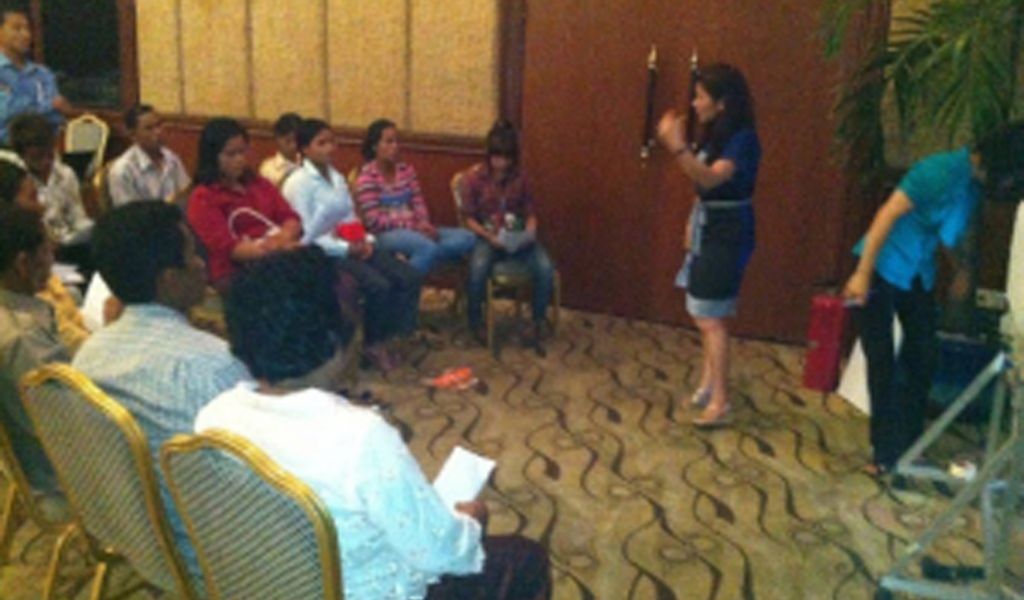Reducing the Gender Gap

Harnessing the skills and contributions of women working at the grassroots level – something which often goes unsung and escapes formal income assessments – is essential for any sustained success in community forestry. RECOFTC's effort to mainstream gender concerns across its programs was the subject of a workshop organized together with Cives Mundi, a Spanish NGO, in Phnom Penh, Cambodia, on 29 June, 2012.
The workshop on Gender Mainstreaming in Community Forestry Management Planning reflected on lessons learned and experiences from the Prakas II Project on “Community Forestry in Northeast Cambodia,” which is funded by the Spanish Agency for International Cooperation and Development (AECID) and is carried out in the provinces of Mondulkiri, Ratanakiri, Strung Treng and Kratie. While the project seeks to strengthen the institutional and technical capacities of local NGO partners and forestry administration staff in community forestry management, it has also mainstreamed gender in the community forestry management planning of 16 community forest (CF) sites with the specific objective of improving women’s participation in CF development.
The workshop was attended by 56 participants including the gender focal persons from the 16 CFs in the target provinces.
Impressive Result
It was clear from the presentations that the field trainings on gender inclusion carried out in the 16 target CF communities by the forestry administration staff, local NGO partners and RECOFTC, had clarified concepts and helped identify existing gender gaps in the development of community forestry. RECOFTC and local NGO partners – the Non-Timber Forest Product Organization (NTFP), Culture and Environment Preservation Association (CEPA), and Kasekor Thmey (KT) – had established coordination links between community forestry gender focal persons and women members of commune councils responsible for gender, to ensure that gender issues were integrated into commune development plans and mainstreamed into the community forestry management planning process. In each CF site, two gender focal persons (32 in total) were selected by the community members themselves to lead the process of mainstreaming gender in community forestry development.
As a result of these efforts, the participation of women in community forestry activities increased significantly. For instance, more women than is usual were involved in forest management planning activities - i.e. preparations for community forestry management planning (44% women), managing development funds (24%), dividing management blocks and field verification (34%), participatory resource assessment/forest inventory (20%), and drafting community forestry management plans (31%). These results have encouraged even more women to become active in a range of activities including capacity building trainings, workshops and study tours. Some are already engaged as members of the community forest management committees (CFMCs) and are actively involved in the decision making process.
Challenges Remain
Though gender is integrated into community forestry management plans (CFMPs), traditional norms, culture and social constructs proscribe the role of women in Khmer society, particularly at household and community levels. Some women are still not allowed to travel far to attend relevant meetings and others can barely read and write.
Besides mobility restrictions, women’s low confidence, poor literacy and limited capacity, hinder their active participation in community forestry related activities. They are usually shy and barely speak about their concerns and problems.
However, there also has been a growing realization among forest users, community and local authorities in the project sites that facilitating and encouraging women through the process of gender mainstreaming would be an effective way to increase their participation and to change the attitude towards them in Khmer society. It was learned that women often discuss, find solutions to their own problems and define their roles and responsibilities keeping cultural norms and their rights in mind, but mainly in the women’s working groups.
Encouraging women through these groups to participate in capacity building training programs, with allocation of adequate funds for applying this knowledge and skills in the field, is a proven strategy for success. RECOFTC’s training-for-action approach, adopted by the Prakas II project to support women’s involvement in the process of community forestry management planning, has been very effective.
Institutionalizing Change
The results encouraged participants to suggest adequate funds be made available to continuously build the capacity of commune and community gender focal persons through various training programs that RECOFTC offers. They also stressed the need to reactivate the National Community Forestry Coordination Committee and establish the Cantonment Community Forestry Coordination Committee where gender-related issues could be raised and discussed. Ms. Bhawana Upadhyay, RECOFTC Program Officer for Gender and Rights, noted that any efforts at mainstreaming gender participation in community forestry had to include men, particularly when working with societies where women’s roles and expectations are traditionally defined.
In closing, Mr. Edwin Payuan, RECOFTC’s Cambodia Country Program Coordinator, said he hoped that the impressive response from the 16 target CF communities would encourage other local organizations, including the Forestry Administration, to further mainstream women’s participation in the country’s Community Forestry Program.
——————————————————————————————————
For more information on the Prakas II project being carried out in Cambodia, please click here.
To learn more about RECOFTC's additional efforts to integrate gender as a cross-cutting issue in all of our programs, please click here.

